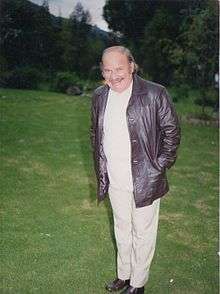Hernando Casanova
Hernando Casanova Escobar known as El Culebro Casanova (Neiva, Huila, April 21, 1945 - Bogotá D.C., October 24, 2002)[1][2][3], was an Colombian actor, director, singer, and presenter. He is considered one of the precursors of comedy and one of the most important actors in the history of Colombia.[4][5] His versatility as an actor led him to become one of the greatest icons of acting in Colombia.[6][7] He was considered during a gap his career as the best actor in Colombia.[8] In a career spanning over four decades, he received multiple recognitions for his artistic achievements, including a nomination as a 'revelation actor' at the Ondra Awards in Spain and an award for 'best dramatic actor' at the APE.
Hernando Casanova | |
|---|---|
 Hernando in early 2000s | |
| Born | Hernando Casanova Escobar April 21, 1945 |
| Died | October 23, 2002 (aged 57) Bogotá, Colombia |
| Nationality | Colombian |
| Occupation | Actor, director, screenwritter, singer, composer |
| Years active | 1965–2002 |
| Height | 5 ft 7 in (170 cm) |
| Spouse(s) | Elsa Ruiz
( m. 1969; div. 1983)Gilma Sampayo
( m. 1984; div. 2002) |
| Children | 5 |
Casanova started out as a singer at the Club del Clan (1966) and then debuted as an actor with a minor role in Cartas a Beatriz (1969).[9] Later His career gained national recognition for his role as Hernando María de las Casas in the TV series Yo y tú (1975) by Alicia del Carpio. Wide acclaim and recognition came with his breakthrough role as Eutimio Pastrana Polanía from Don Chinche (1982) by Pepe Sánchez. Where fed with the idiosyncrasy of his hometown people, he became one of the most representative and influential figures in the history of Colombian Television. Likewise, Casanova was a pioneer in the sketches format when he was directing, writing and acting in Los Meros Recochan Boy’s, a section of Jimmy Salcedo's hit show El Show de Jimmy (1971).[10][11] Other of his most notable roles include Salomón in Embrujo Verde (1977), his leading role in Farsán (1983), as presenter in El tiempo es oro, su pueblo gana (1986), Wilson Rodríguez in El Pasado no perdona (1991), Yardines Murillo in Perro Amor (1998) and Vicente Secretario in Amor a mil (2001). In cinema, Casanova was the flagship actor of the Chilean filmmaker Dunav Kuzmanich, even naming him as "the best Colombian actor of all time".[12] Casanova acted in films such as Canaguaro (1981), La agonía del difunto (1982), Mariposas S.A (1986) and Apocalipsur (2007).
In 2015 his children began the production of a documentary feature about his life entitled El Culebro: La historia de mi papá.[13] The film tells the actor's life from the perspective of his youngest son, Nicolás Casanova. It premiered on 20 September 2017 at the Eureka Film Festival. The documentary received favorable reviews and was widely received by the Colombian public, highlighting its historical importance. Subsequently, the film was broadcast on the TV show Entre Ojos from Caracol Televisión, becoming the most watched program of its time slot that day. In addition, El Culebro: The exhibition, a sample of photographs, video clips, recognitions and costumes of Casanova's characters in La casa del Huila in Bogotá, was held.[14]
Casanova's controversial private life received much attention. His parties, disorder and excesses led him to struggled with depression and anxiety. He was married twice and had five children. He died on October 24, 2002 from a sudden heart attack at the Cardioinfantil Foundation in Bogotá. His death was a national mourning and was considered an invaluable loss in the Colombian entertainment business.[15]
References
- "Adios a el 'Culebro' del humor". El país. Retrieved May 29, 2020.
- "Carlitos" (in Spanish). Retrieved March 2, 2018.
- "Entrevista de Juan Harvey Caicedo a Hernando Casanova". YOUTUBE. July 23, 2012. Retrieved November 9, 2015.
- "Julián Arango, infiltrado". El Espectador. September 1, 2011. Retrieved June 1, 2020.
- "10 personajes que marcaron la historia de la pantalla colombiana". La Vanguardia. La Vanguardia. Retrieved June 1, 2020.
- Patiño, Jorge. "La locura y el método del Culebro". Esquire. Esquire. Retrieved June 1, 2020.
- "La tele letal con Dago García". La Tele Letal. Retrieved June 1, 2020.
- "Expediente Final: Culebro Casanova". Caracol Televisión. Retrieved June 1, 2020.
- Hozzman, Édgard. "Así empezó la balada en Colombia". Eje 21. Eje 21. Retrieved June 1, 2020.
- La caja mágica. Semana. p. 58. Retrieved June 1, 2020.
- Viveros, Wilson. "Yo fui un... Recochanboys". Revista Soho. Revista Soho. Retrieved June 1, 2020.
- Osorio, Oswaldo. "Dunav Kuzmanich: el compromiso, la valentía y el puro cine". Festival de cine de Santafé de Antioquia. Festival de cine de Santafé de Antioquia. Retrieved June 1, 2020.
- "Habrá documental sobre la vida del "Culebro" Casanova". Publimetro. Publimetro. 2015. Retrieved June 1, 2020.
- "Nicolás Casanova y el documental sobre su padre "El Culebro Casanova"". Caracol Radio. Caracol Radio. September 2, 2017. Retrieved June 1, 2020.
- León Giraldo, Diego (October 25, 2002). "Humor: el legado del Culebro". El Tiempo. El Tiempo. Retrieved June 1, 2020.